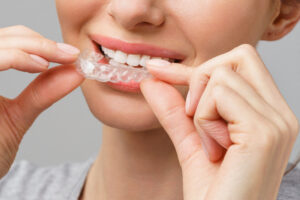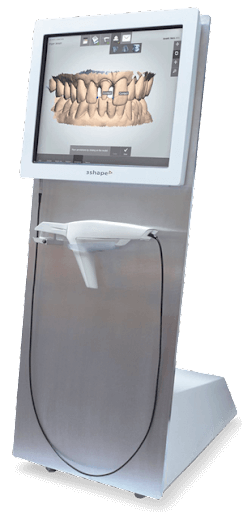Bruxism – a condition characterized by teeth grinding – affects approximately 10% of adults and 50% of children. Similarly, TMJ disorder – which refers to issues with the temporomandibular joint – impacts millions of individuals. Surprisingly, many people remain unaware that they suffer from either of these conditions. The primary reason for this lack of awareness is that severe teeth grinding predominantly occurs unconsciously during sleep, and TMJ disorder is a condition that sufferers often know little about.
In some cases, a night guard may be prescribed by a dental professional to help with these conditions.
Here, we’ll examine some common indicators associated with bruxism or TMJ, which may point to the possibility of using a night guard.
Unexplained Dental Damage

Patients may experience wearing down of tooth enamel or damage to dental restorations like fillings or crowns without understanding the cause.
Tension-Type Headaches
Individuals frequently endure these headaches, particularly upon waking up in the morning.
Sleep Disruption
Both the patient and those around them may experience sleep disturbances due to the sounds of teeth grinding during the night.
Clicking and Popping Sounds
Patients may notice clicking or popping sounds when they open their mouths. This could indicate issues with the temporomandibular joint.
Tooth Pain or Jaw Soreness
Discomfort in the teeth or jaw area can be a sign of underlying bruxism or TMJ disorder.
Difficulty Chewing
Some individuals may have trouble chewing. They may feel like their upper and lower teeth are not aligned properly.
Cheek Damage
Patients may observe signs of damage caused by unintentional chewing on the inside of their cheeks.
Consider the Symptoms
When you look at the above-stated symptoms, it becomes evident that timely intervention is important. The damage inflicted upon teeth through unconscious nightly grinding or clenching of the teeth and jaws can be both financially burdensome and detrimental to your patient’s sleep and overall well-being.
If patients regularly experience any of the aforementioned signs, it may be smart to recommend the use of a night guard. When compared to the costs associated with restorative or cosmetic dental treatments, a night guard represents a relatively small investment to safeguard both dental health and overall well-being.
What Is a Night Guard?
A night guard acts as a protective barrier. It helps to prevent the direct impact of grinding forces on the teeth and distributes them evenly, thereby minimizing potential damage.
By recommending a night guard, dental professionals can help patients mitigate the consequences of bruxism and TMJ disorder. Not only does this preventative measure reduce the need for costly dental repairs, but also promotes better sleep quality and improves patients’ daily lives. What’s more, emphasizing the importance of early detection and intervention allows individuals to take proactive steps toward maintaining their oral health and well-being.
Could You Benefit from a Night Guard? Ask a Dental Professional from Next Dental Lab
Identifying the signs associated with bruxism and TMJ disorder is vital for both patients and dental professionals. By recognizing these indicators and recommending the use of a night guard, dental professionals such as those at Next Dental Lab can assist patients in protecting their teeth, sleep, and overall health.
If you are experiencing the above symptoms, are you ready to take this proactive approach to ensure you receive appropriate care and support in managing the common yet overlooked conditions of TMJ or bruxism? Rather than a night guard, are you interested in another dental procedure or products such as partials and dentures? Either way, we can help. Get in touch with us.

